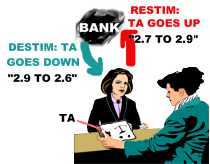Auditor's Beingness |
||||||||||||
When you as a student auditor have covered all your basic training, such as metering and TR's, when you have sorted out all your technical uncertainties and done all the drilling required, you can move up to a new level of competence. You can assume the full beingness of a professional in your field. At this point you should apply the Auditor Beingness step. You would have to be confident about all your basic skills and tools or it wouldn't be successful.
TR's reflect the auditor's attitude. What is behind attitude is Certainty and Beingness. Your TR's, at this level, expresses your beingness and your attitude towards your pc's. If you as an auditor would simply try to get by with a robotic imitation of an attitude, identity and tone level, you wouldn't have any presence at all. It would be apparent in your TR's. Beingness comes first. That gets reflected in your attitude. Your attitude will be expressed in your TR's. What influences a professional Beingness? First and foremost Certainty! Before you can assume the beingness of an auditor you must have gotten the certainty on the materials of processing. You must know your tools of the trade, the basic data and actions. The most basic skills of an auditor are the TR's and Meter skills. Assuming this beingness and doing the steps leading up to it will directly have an effect upon your pc's. With this put in they will be more easy to get 'in-session', meaning, 'Interested in own case and willing to talk to you'. TR's, Meter and In-Session Your first task as an auditor is to be able to put the pc in-session. Unless you can do that nothing in terms of progress and case gains will happen for the pc. With your TR's in in a natural and in-ARC manner, the pc will feel he is being listened to; he will feel he is receiving your undivided attention and he will be willing to talk to you. Let's say you still had all kinds of uncertainties about your basic tools. Would you be able to give him your undivided attention? No! All your uncertainties would be major distractions. You would fumble around with the Meter, not know what to say next, etc. But if your metering is spot on the reality factor will start to build up between you. You say something reads and the pc can feel it and he can easily find it in his Bank and he trusts you a little more. So he will quickly be in-session with you. This in-session definition can not be stressed enough. The basic thing that has to be in for case gains to happen is: Pc interested in his own case and willing to talk to the auditor. That deserves to be repeated: The basic thing that has to be in for case gains to happen is: Pc interested in his own case and willing to talk to the auditor. TR's and In-Session Back then R. Hubbard had a funny experience happening to him. He would audit somebody in London, then go away and some time would pass. He would come back six or eight months later, after having spent the intervening time in USA. When he came back he would audit the same pc and find him at the exact same point as a case as where he had left him. In the meantime the pc had been audited by several other auditors for quite some hours. The staff in London would explain it away with, "Well, of course, Ron is a good auditor," quite naturally they said that about him. But it was actually quite a critical statement concerning the other auditors as there was quite a lot of processes being run in those days. So how could it happen that that a pc stayed parked right where Ron had left him? The answer is simple. When Ron Hubbard was auditing him, pc was interested in his own case and willing to talk to the auditor. In-session! That was all. The phenomenon was quite evident. Another anecdote adds to this. Every now and then Ron would arrive at the London Office and people would come in from the surrounding areas and hang around in the reception. Ron was busy and walking around the offices a lot, and as he would get out in the reception area someone would rush up to him and tell him an awful story. This person's wife had just left him, or that person had just gone Bankrupt or something terrible like that. They would tell him these stories and he would acknowledge them and then start to say something about what could be done about it. But they usually didn't hang around to hear the advice after the acknowledgment. They would go off and seem perfectly happy after the ack. This didn't just happen one time. It happened many, many times. He never did anything to solve any of these problems, and there were tons of them. Very odd indeed. He began to wonder what exactly this phenomenon was and a senior staff member said: "They just want you to know about it and that makes them feel better." But what it really was, was simply TR-2, acknowledgment at work. They were willing to talk to Ron about their problems and he was concerned, he was interested in them, and he did acknowledge that it was a bad situation and so on. This apparently was enough to convince them about that they had now talked about their troubles and been heard, and that was it. Simply he was willing to listen to them and acknowledge it. Apparently that would blow it. That is TR-2. The whole point of this story is, that if your TR's were good enough you could almost skip using processes and get a surface level of case gain. You wouldn't get anything in depth but you would get a feeling of relief and case gain in the person. Earlier Practices It is about the same mechanism that gives psycho-analysis some workability - even though they haven't heard about acknowledgment, let alone a drill like TR-2. The typical picture here is a patient that goes on and on talking. The analyst's TR-2 is obviously totally out or the pc wouldn't overrun that badly. Very early on R. Hubbard didn't think of communication as something that could be broken down into drills like the TR's. One time, when he was demonstrating auditing to some students, one bright student would say afterwards: "He acknowledges what the pc says!" This had never occurred to R. Hubbard as something special before or not as a natural thing all auditors would do. But apparently it was. Then he started studying communication and developed what became the TR's. But the point of these stories is, if your TR's were good enough you would gain a reputation as a great auditor without doing anything else. Communication alone and being a good listener make people feel better. They feel they are being listened to, understood and acknowledged. So this is why TR's have everything to do with in-session. The Meter and In-Session It is important for the pc to realize that metering
has to do with his case too. The Meter is measuring reactions to impingements in life. That is all there is to it. In a pinch test it is measuring the reaction to the impingement of the pinch. If the Meter reads when you ask about "ARC break," it is reading either on the fact that the pc has an ARC break or that he is startled to be asked if he has an ARC break when he really has a problem, but it is reading on something. You don't just walk on past it. You may have to check 'Suppress' and 'False' when all is not running well. Because for a Meter to read, something must exist for it to read on. And normally it is exactly what you said. You said "Do birds swim?" and it reads. There is something there. An accurate Meter does not read for no reason. Your knowledge of the Meter and your skill with a good operating Meter has to be such, that you have certainty on this and can't be given a sales talk and sold on the idea that "There's nothing there. I don't think there is anything there" by the pc or anybody else. Without that certainty it goes out the window.
Instead of asking "What was that withhold?" and really clean it
up, you'll say, "Well, maybe . . . All right, maybe it was something
else...." Without certainty on the fact that when the Meter reads it reads on something, you're going to be unsure of what to ask the pc. That will affect your attitude and beingness and the pc goes out of session. An auditor must also know what the reads mean. He observes the Meter reaction; that's an observation. After observation there is a point of interpretation. These are two different steps. You have to get observation down before you can do the interpretation. So there is observation when you ask the auditing question and then you have to know what a Meter reaction means. (1) The auditor determines to find out something. That is the question. (2) It is followed by an observation; (3) and that is followed by an interpretation. It is 1, 2, 3, three different steps. You've got to single out the observation as to what it is, and then the interpretation as to what it means. You will have to have these things separated out from each other. There is nothing complicated about any of this unless someone makes it complicated. There can be an infinity of "facts" and only one truth, so that one truth gets lost like a drop of water in the ocean. Which is the real drop of water? I'll tell you what the drop of water is: It is the point of observation. And part of that observation is the fact that the Meter is connected to the pc and the pc does have a Bank. It then becomes clear that the Meter reads because there is something there for it to read on. So there is an area of competence and confidence in the Meter which has to be there. When this is accomplished it adds directly to the auditor beingness. This then results in greater confidence on the part of the pc which then helps the pc's ability to be in-session. Auditor Beingness You may ask: "How do I assume a beingness?" "Is it an artificial beingness I'm wearing?" "Do I need to adopt a different beingness?" It is not a listing question, such as "What am I being?" It is something you simply have to work out for yourself; there isn't anybody who can do it for you. In working this out, you can get into things as 'interesting' and 'interested'. An auditor has to be interested. There is nothing worse than an auditor trying to be interesting. If you don't like the chair you use as an auditor, it will color your performance and beingness; say it is too hard - It will color your attitude. If your confront of evil is very poor, it will show in your TR-0 and can cause you to all kinds of problems in session. What does confront of evil have to do with beingness? Let us say a pc comes in and says, "I have just killed a cat and I really enjoyed it!" and you get all upset. You are never going to get him in the kind of shape where he doesn't kill cats. Why? Because he has just learned that he shouldn't talk to the auditor about certain things. Whatever you're doing as an auditor, if you're
doing it through a colored beingness you've got a misaligned attitude and
your pc becomes unwilling and less in-session. You start developing
session withholds in the pc. These will be innocent withholds, such as
"I don't have any interest in that but I won't tell him so," or
"I didn't really think that read...." If you're not sure of your beingness, if you haven't decided upon it yet; if your beingness is uncertain, then your attitude toward the pc will be uncertain too. And your attitude toward the pc will then color your TR's. In that case you can ask "Do fish fly?" until Hell freezes over and drill and drill and drill continuously and religiously. And you are not going to get anywhere until you get your beingness and your attitude settled. What is auditor beingness? Well, what are you being as you sit in the auditing chair auditing the pc? Are your beingness somebody he would be willing to talk to? Your general attitude as expressed in your TR's is what signals this. Your beingness as an auditor is something you yourself must decide upon. It is a step to be taken when you are certain of all your basics in auditing. It all has to come together in a focused and aligned way. It could be done in minutes or it could take hours or days. But if you take a look at all of this data and apply it, you actually could simply decide "What is my beingness as an auditor?" and "Exactly what is my attitude toward pc's?" and your beingness as an auditor might suddenly go click. Your attitude then will fall comfortably into place, and that will be expressed and reflected in your TR's. These are the skills you need. But it is the basic simplicity you are after. It all has to click and fall into place. Leonardo Da Vinci convinced the Pope of his time, that he was the right man for doing the paintings inside the Sixteenth Chapel, simply by drawing a perfect circle for the Pope - free hand. It is a real simple, but also an awful difficult thing to do. It was absolutely perfect. The Pope was so impressed by this - and rightfully so - so he immediately commissioned Leonardo. He had demonstrated mastery of his craft and an accomplished artist's beingness. In a similar way, you as an auditor, now ready to graduate, have to put all your drilling and all the details aside. Your attention is no longer on the nitty gritty details. It all has to come together as the natural thing to do. You have mastered all these skills so you can do them effortlessly and without being distracted. You have worked out all the snarls and practical problems of "What do I do if....?" They all add up as elements of your auditor beingness. But your attention and focus, your attitude towards the pc, your TR's and metering have all come together to accomplish one thing: put the pc in-session and audit him towards case gains, more self-determinism and freedom. It begins with certainty on technical basics, TR's and metering. It's then a matter of assuming an auditor beingness which comes across in your attitude. At that point your TR's, already well drilled, can be brought up easily to a point of flawlessness. And from there it's a short step to your pc's, each and every one, interested in own case and willing to talk to you.
|
||||||||||||














